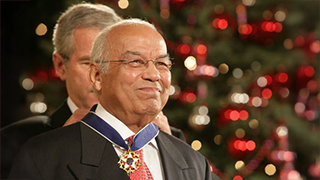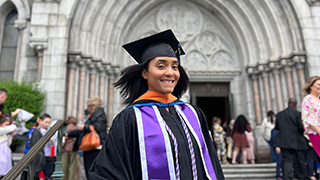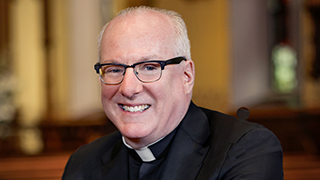A Professor’s Discovery in Salerno: Ancient Pages Tell the Church's History Through Layman’s Account
Wednesday, August 28, 2024

Professor William Connell.
In 2018, while in Salerno, Italy to present his work on a book, Professor William Connell wandered into an Amalfi coast antique shop. "There I found, to my surprise, among books or manuscripts...two of them from the 1500s, one from the 1600s and one from the 1800s," recalls Connell. "I was amazed," he said of his discovery of the only known copy of The Republic of the Church, the first account of the Catholic Church's history written in 1541 by a non-clergyman named Donato Giannotti.
He believes there is more to be learned about Giannotti and his writing. Professor Connell has already made strides here: he will present on his book in Rome on June 17, 2024 at the Church of San Giovanni Battista dei Fiorentini alongside Italian colleagues Elena Valeri, University of Rome, La Sapienza, and Alessandro Campi, University of Perugia. Afterwards, Connell will travel to Lyon, France, where, as co-organizer of an international conference on Giannotti at the University of Lyon on June 20-21, Connell will present this important text to the world.
Speakers will attend from France, Italy, Brazil and the United Kingdom, and the audience will include scholars interested in the Renaissance, sixteenth-century Europe, and republicanism vs. monarchical government. The conference is devoted to Giannotti’s long career: "The sessions cover Giannotti’s time as Secretary of the Florentine Republic during a war and long siege, 1527-1530," says Connell, "[and] his relationship with his patron, Cardinal Ridolfi, the dramas he wrote, his importance as a political theorist of republican government, the subsequent reception of his ideas, his history of the Church and his views on Church reform and its relevance for today."
Professor Connell is the La Motta Endowed Chair in Italian Studies, College of Arts and Sciences, and in 2023, he published a re-issue of Giannotti’s book in Italian, Della Republica Ecclesiastica (Einaudi). The text debuted to positive reviews and attention from both domestic colleagues and international, including a colleague at the University of Lyon in France, who authored her dissertation on the subject. Connell’s ongoing interest in Giannotti will yield essays from the Lyon conference, to be published later by Garnier Classiques.
Connell likened his 2018 discovery of the ancient text to an "Indiana Jones story...I think it can be called quite legitimately, the first modern history of the Church." Donato Giannotti, he discovered, was one of the leading humanists of 16th century Italy (according to a letter published in the late sixties by a former teacher of Connell’s).
Connell’s detective work on Giannotti’s text revealed a rich history of the Church in Europe in the 1500s, and what was happening in politics and religious circles at that time. "The Lutheran Reformation began in 1517 when Martin Luther nailed his 95 theses against the doctrine of indulgences to the door of the Chapel Church in Vincent Bergamo," said Connell. "In the next years, the controversy exploded, and by 1541, when Giannotti was writing, a good portion of Germany and other parts of Europe, the Netherlands, France had adopted different forms of Protestantism seen in Switzerland, challenging the idea of papal primacy."
Connell was also amazed to find in the text a detail of how the mass itself and other traditional practices had changed during this time. "I read of a rearranging and reforming the mass and how it was said, including giving communion…with bread and with wine, and challenging various elements of what had become traditional doctrine within the church."
Professor Connell recalls that as a young scholar graduating from the University of California, Berkeley with a doctorate in Renaissance history, his interests were evolving. "I was very interested in social history, relations of patrons to clients, how political parties were formed, and the role of wealth of neighborhood marriages and creating alliances," he says.
Describing himself as a social historian who was also interested in political thought, these days, Connell says his work, particularly the discovery of the Giannotti text, has taken him deeper into questions of the Church’s physiology; how the church is organized and its history. "It's also taken me back to lessons I learned at Berkeley with wonderful professors like Peter Brown, Stephan Kuttner, William Bosma and Randolph Stern, studying how the church evolved from the time of the Roman Empire and the first Christians down to the modern world," he told Seton Hall University Libraries' Sarah Ponichtera on Zet Forward. "Rather than [going] in a completely new direction, certainly, my work now does address questions of piety, and religious practice in a deeper way."
As a consummate researcher, Professor Connell is as much at ease in any library as he is helping to build one: indeed, he has been instrumental in developing and building the Valente Italian Library at Seton Hall, for which Connell has arranged donations of books. "I'm always trying to find ways of boosting the library just because I do so much work in it myself," he says.
Last fall, he shared that he was working to publish an edition of Machiavelli's The Prince for an Italian publisher, which will be written in Italian and include Professor Connell’s introduction and commentary. He is laser-focused on this summer’s conference, however, given how important he feels the discovery of The Republic of the Church and its history are. "There are other projects," he says, "but it becomes utopian to start to have to rattle them off. We’ll see what I can get done in the next year."
Categories: Arts and Culture, Faith and Service






